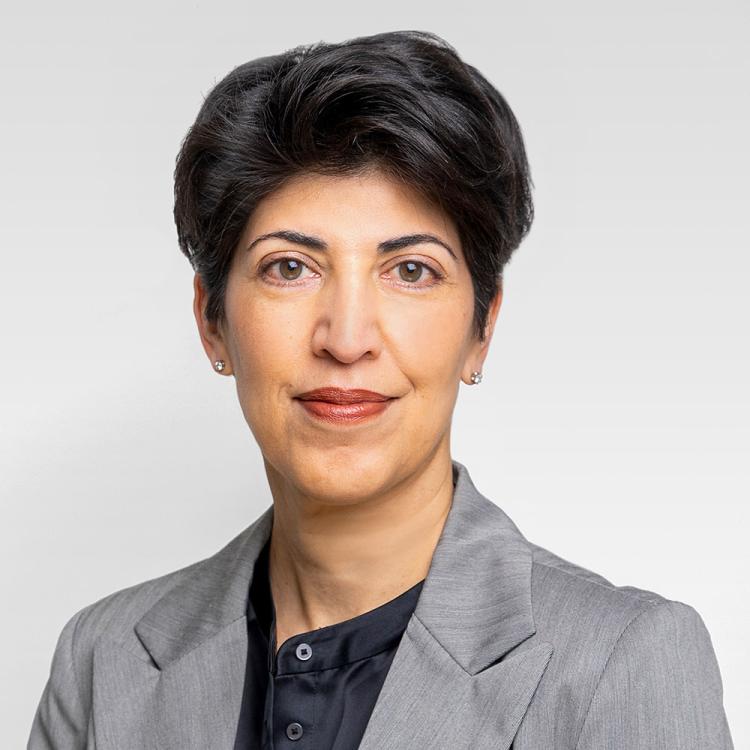The University of Alberta College of Health Sciences is launching an AI + Health Hub to harness the power of data and computing science to solve a wide range of health-care challenges from quicker diagnoses to streamlining hospital queues and discovering new drugs.
The new hub brings together more than 120 researchers from 10 faculties to collaborate, educate and innovate, with the goal of turning AI-driven health-care research into solutions that are accessible to all Albertans.
"It's an exciting opportunity to bridge the digital divide so we can use new technologies to improve health care for everyone," says hub co-lead Neesh Pannu, a nephrologist and vice-dean of clinical research in the Faculty of Medicine & Dentistry.
"We are building a community around the way artificial intelligence is designed and deployed in health-care settings," says co-lead Gillian Lemermeyer, assistant professor in the Faculty of Nursing and assistant adjunct professor in the John Dossetor Health Ethics Centre.
"We want to build on partnerships that already exist between computer scientists and engineers and physicians, and expand that to include all health-care disciplines, artists and sociologists and students and industry," Lemermeyer says.

(Photo: Supplied)
The U of A is already a global leader in artificial intelligence, earning $100 million for AI research since 2017, with 24 Canada CIFAR AI Chairs based at the university and a strong relationship with the Alberta Machine Intelligence Institute (Amii), the only institute of its kind in Western Canada.
Alberta is also home to the largest population-based health data set in North America, which allows research to be based on information about the health of people of all ages, ethnicities and demographic backgrounds, says Pannu, noting that Denmark and Taiwan are the only other places in the world with such a rich resource.
"We have access to the smartest AI scientists in the world and an integrated health system with a single electronic health record for the province, so when we analyze data and discover improvements, we can design tools that benefit everyone and deploy them at scale," Pannu says.
"If you're developing a diagnostic algorithm in a veterans' hospital in the U.S., for example, or in a population of people with private health insurance, the demographic composition is so different from the general population that the product or tool you develop may not be effective when used for an underrepresented population," Pannu explains. "We have the best population-based health data in the western world, which means we can minimize algorithm bias so we're starting in a very good place."

(Photo: Supplied)
AI and health innovations already underway at the university include analyzing ultrasound images taken in remote locations to diagnose hip dysplasia in newborns, using an AI scribe tool to take notes in doctors' offices so they can spend more of their time with patients, and sifting through large data sets of genetic information to predict stroke risk in individual patients.
The new hub is similar to the Climate Change + Health Hub, another research hub out of the U of A's College of Health Sciences that brings together experts from across the university to focus on an urgent and emerging field.
$4 million has already been secured for the AI + Health Hub from Prairies Economic Development Canada, the University Hospital Foundation, the Government of Alberta's Major Innovation Fund and the Henry Gusse Foundation to finance research seed grants, graduate student scholarships, a new interdisciplinary graduate certificate program and support for future commercialization of proven innovations.
Working groups in the hub will tackle rural access, data privacy, clinical trials, diagnostic imaging, telehealth, end-user experience and other key facets of AI in health.
Besides Amii, the new hub is partnering and collaborating with groups such as Alberta Innovates, the Artificial Intelligence in Medical Systems Society, Amazon Web Services and Apple Health.
Pannu and Lemermeyer agree that not every health-care challenge will need an AI solution, but if deployed responsibly AI has the potential to transform health care for the better in many ways, with U of A interdisciplinary expertise leading the way.
"The purpose of the hub is to invite people who are thinking about AI in health in the broadest sense to join us," says Lemermeyer, who is also a member of the Women and Children's Health Research Institute.
"Given the enormous strength that we have in this province and this university in both artificial intelligence and health and health services research, we have the critical people here to do that work," Pannu says.












